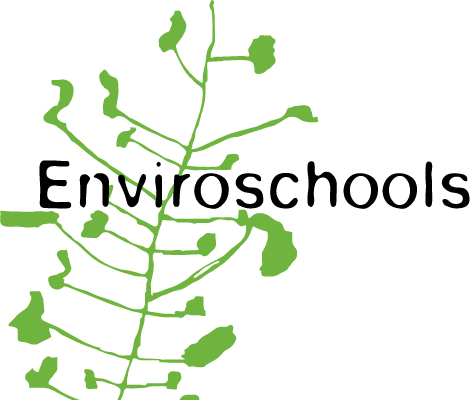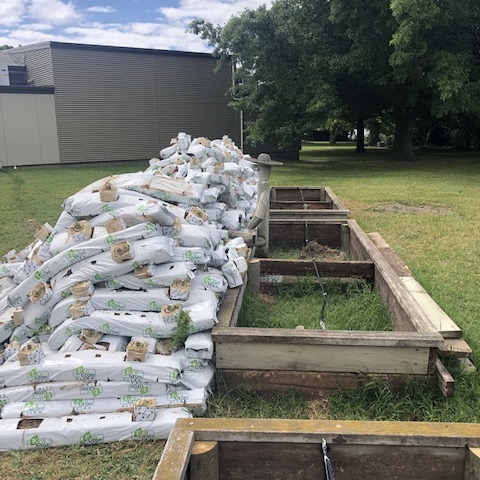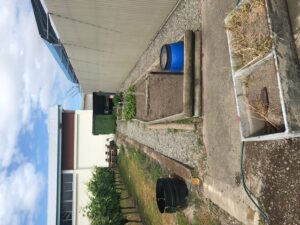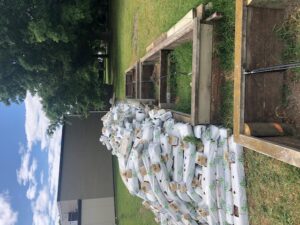Kids Edible Gardens at Redwoodtown School
Redwoodtown School have been busy redesigning their Kids Edible Gardens
Like many schools around Marlborough, Redwoodtown School is a construction zone of new classrooms. As part of the renovations, a decision was made to shift the Kids Edible Gardens and update the garden area. The Envirogroup took up the challenge to investigate where the best place would be and design a new Kids Edible Garden. Although it was tempting to rush in and build a new garden, they wanted to engage the whole school and seek feedback on how all the students would like their gardens to be.
“It took a lot of time and effort. We thought it would be something that was quick and easy but in fact it was the opposite.”
Their starting point was the specific design principals that had to be considered. The Envirogroup became Landscape Architects for an afternoon, investigating how some of the atua would influence their decisions on where to place their garden.
Where would they be able to use Tamanuitera to his best so that the plants in the garden could capture his energy for growth. Was there a place where Tawhirimatea was gently felt? Hinetakurua brings frost when she visits the garden, could they find a space that is protected from frost? 
The Envirogroup also had to consider how they would get water to the garden when Ranginui holds onto his rain through the summer. Would they have space for a tool shed, a worm farm or compost system? Access to the garden for all students would be important. How could they work with Tanemahuta to encourage insects for pollination?
Just as important as these aspects of design were questions around what they wanted their garden to feel like. What special qualities did they want it to have? How could they make it a place that the school values?
They used the Special Places activity from Me in My Environment to help them explore these questions. Then set about describing how they wanted their garden to be, look, feel, and sound. Thinking about what they wanted to do in their garden rather than thinking about materials, items and things also helped them vision their garden in a different way.
In order to bring the whole school into the process, the Envirogroup spoke to staff one morning teatime to explain what they were doing and ask for their help. They wanted teachers to run activities with their classes that would help the Envirogroup gather feedback, suggestions, and ideas. The Envirogroup worked hard to put together activity packs for the teachers that contained all the resources they would need to run Special Places, Word Hunt and Alphabet Hike with their classes.
Keen to support the Envirogroup with their action project, the teachers scheduled a class time for the activities within a few weeks.
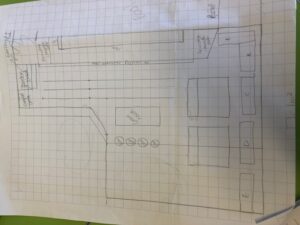 The next task for the Envirogroup was to bring together the thoughts and ideas of the school, focus on the big ideas that emerged and create statements that described them so that designing a plan would be more manageable. It was no easy job! But wow what a plan they came up with.
The next task for the Envirogroup was to bring together the thoughts and ideas of the school, focus on the big ideas that emerged and create statements that described them so that designing a plan would be more manageable. It was no easy job! But wow what a plan they came up with.
“We had to think outside the box to repurpose old items we already had at school, in our new space. We not only wanted to incorporate our values, but we had to use and show them in the design process. Some ideas were too ambitious to begin with and we had to make several adjustments along the way to ensure it was perfect for our kura.”
They took it to their Principal for signoff before placing it in the hands of a professional designer to ensure it was workable.
The Envirogroup and the Principal want the new garden to be built by the end of the year with the view of using the Kids Edible Gardens for a whole school inquiry into sustainability and growing your own food.
“We are so excited to have the gardens completed. We can’t wait to be self-sustaining with our own seed to table process.”
The Envirogroup are not sitting on their hands while the new gardens are built, they are busy researching what to plant and in which beds, plants suitable for bee and butterfly gardens, and designing permanent plant markers and information boards for utility areas e.g., compost – what can go in, what to leave out.
Despite Covid interruptions the Envirogroup are hopeful the gardens will be ready in time. They would like the senior students to see the gardens in place before they leave for college next year.
